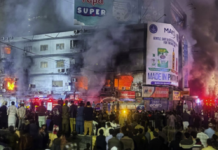DHAKA– A new report has raised alarms over the deteriorating law-and-order situation in Bangladesh, warning that the rise of anti-democratic and radical outfits has unleashed violence against minorities and emboldened extremist groups in the wake of Prime Minister Sheikh Hasina’s ouster.
The Eurasia Review report, published just ahead of Chief Advisor Muhammad Yunus’ scheduled address at the UN General Assembly, described conditions in Bangladesh as a “nightmare,” citing mob rule, militant resurgence, and systematic targeting of vulnerable communities. It pointed to a wave of violent attacks on more than 450 police stations that followed the collapse of the Awami League government, during which thousands of prisoners—including suspected militants—escaped custody.
Political analyst Anjuman A. Islam, quoted in the report, wrote that policies adopted by Yunus’ government had “emboldened Islamists, militant outfits and criminals — all that had remained fringe groups under the ironclad rule” of the previous regime. The report also noted that Hizb ut-Tahrir and other extremist groups have openly called for war on Westerners, while leaders linked to Al Qaeda affiliates were freed from prison and welcomed publicly.
According to the findings, Bangladesh’s 10 percent minority population—including Hindus, Christians, Sufis, Ahmadis, and Buddhists—along with women have borne the brunt of the unrest. More than 100 Sufi shrines have been torched in recent months, rights groups said, while violence, looting, and sexual assaults against minorities have been widely documented. Community representatives allege that perpetrators act with impunity, with authorities dismissing their complaints as exaggerated.
The report further detailed that courts have approved bail for hundreds of prisoners accused of militancy, including convicts on death row. Critics have accused senior officials of openly embracing known extremist figures, stoking fears of institutional complicity.
International concern is also mounting. The Canadian government recently issued a travel advisory warning citizens to exercise heightened caution over potential militant attacks in Bangladesh.
The unrest has cast a shadow over Yunus’ leadership and his upcoming UNGA address, with analysts noting that international scholars and human rights advocates are increasingly skeptical about his administration’s ability—or willingness—to rein in extremist violence. (Source: IANS)














